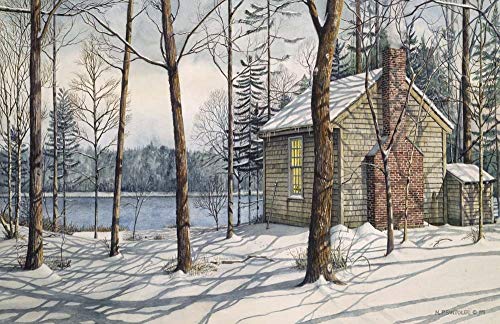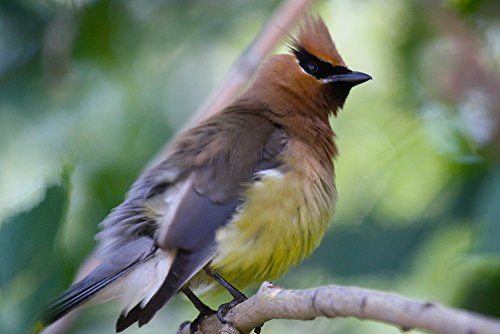9 A.M. To Flint's Pond via Walden, by railroad and the crust. I hear the hens cackle as not before for many months. Are they not now beginning to lay? The catkins of the. willow by the causeway and of the aspens appear to have pushed out a little further than a month ago. I see the down of half a dozen on that willow by the causeway; on the aspens pretty generally.
I hear several times the fine-drawn phe-be note of the chickadee, which I heard only once during the winter. Singular that I should hear this on the first spring day.
At Flint's I find half a dozen fishing . The pond cracks a very little while I am there, say at half past ten. I think I never saw the ice so thick. It measures just two feet thick in shallow water, twenty rods from shore.
Goodwin says that somewhere where he lived they called cherry-birds "port-royals."
Haynes of Sudbury brought some axe-helves which he had been making to Smith's shop to sell today. Those made by hand are considered stronger than those which arc turned, because their outline conforms to the grain. They told him they had not sold any of the last yet . "Well," said he, "you may depend on it you will. They've got to come after them yet, for they haven't been able to get into the woods this winter on account of the snow, and they 'll have to do all their chopping this month." (1856)
Here is our first spring morning according to the almanac. It is remarkable that the spring of the almanac and of nature should correspond so closely. The morning of the 26th was good winter, but there came a plentiful rain in the afternoon, and yesterday and to-day are quite springlike. This morning the air is still, and, though clear enough, a yellowish light is widely diffused throughout the east, now just after sunrise. The sunlight looks and feels warm, and a fine vapor fills the lower atmosphere. I hear the phoebe or spring note of the chickadee, and the scream of the jay is perfectly repeated by the echo from a neighboring wood. For some days past the surface of the earth, covered with water, or with ice where the snow is washed off, has shone in the sun as it does only at the approach of spring, methinks. And are not the frosts in the morning more like the early frosts in the fall - common white frosts? (1854)
Archive
-
1850
- Oct 15, 2019 October 14
- Oct 1, 2019 October 1
- Sep 9, 2019 September 9
- Aug 30, 2019 August 30
- Aug 29, 2019 August 29
- Aug 24, 2019 August 24
- Aug 1, 2019 August 1
- Jul 29, 2019 July 29
- Mar 27, 2019 March 27
-
1852
- Oct 13, 2019 October 13
- Aug 18, 2019 August 18
-
1853
- Jun 30, 2019 June 30
- Mar 31, 2019 April 1
- Feb 22, 2019 February 23
- Jan 22, 2019 January 23
-
1854
- Dec 5, 2019 December 5
- Jun 30, 2019 June 30
- Mar 16, 2019 March 17
- Mar 14, 2019 March 15
- Mar 13, 2019 March 14
- Mar 12, 2019 March 12
- Feb 28, 2019 March 1
- Feb 15, 2019 February 16
-
1855
- Mar 13, 2019 March 14
-
1856
- Mar 15, 2019 March 16
- Feb 28, 2019 March 1
- Feb 22, 2019 February 23
- Feb 15, 2019 February 16
- Feb 13, 2019 February 14
- Feb 13, 2019 February 13
- Feb 11, 2019 February 12
- Feb 6, 2019 February 7
- Feb 5, 2019 February 5
- Feb 3, 2019 February 4
- Feb 2, 2019 February 2
- Jan 29, 2019 January 29
- Jan 27, 2019 January 28
- Jan 26, 2019 January 27
- Jan 25, 2019 January 26
- Jan 22, 2019 January 23
- Jan 20, 2019 January 21
-
1858
- May 31, 2019 May 31
-
April 28
- Apr 28, 2022 April 28
-
Ash Trees
- May 20, 2020 May 21
-
August 27
- Aug 27, 2019 August 27
-
Birds
- Apr 28, 2022 April 28
- Feb 26, 2020 February 26
-
Cows
- Aug 22, 2024 June 20
-
December 16
- Dec 16, 2024 Feet and Hands
-
Fate
- Nov 17, 2020 November 17
-
Frogs
- May 20, 2020 May 21
-
Ice
- Feb 26, 2020 February 26
-
June 20
- Aug 22, 2024 June 20
-
Long-Tailed Meadow Mouse
- May 31, 2020 May 31
-
May 12
- May 12, 2022 May 12
-
May 23
- May 23, 2020 May 23
-
May 31
- May 31, 2020 May 31
-
Meadow
- Feb 26, 2020 February 26
-
Metaphysics
- May 20, 2020 May 21
-
Mountains
- Oct 20, 2019 October 20
-
November 17
- Nov 17, 2020 November 17
-
November 18
- Nov 19, 2020 November 18
-
Weather
- Feb 29, 2020 February 29
-
Wind
- Feb 29, 2020 February 29


